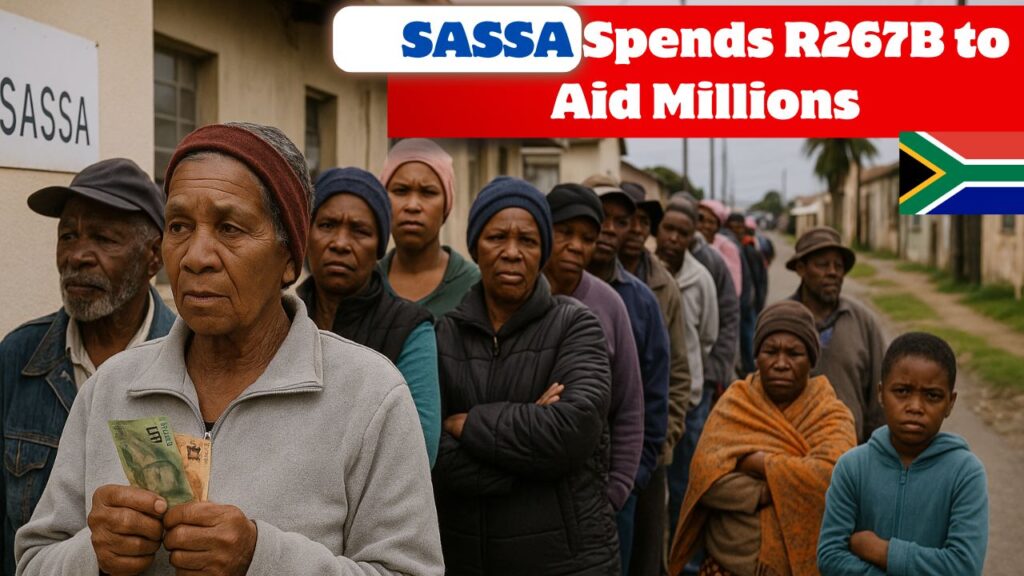The South African Social Security Agency (SASSA) has confirmed a record allocation of R267 billion for social grants in the 2024/2025 financial year, benefiting over 28 million citizens. This massive budget aims to support vulnerable groups, including pensioners, children, and people with disabilities. The initiative highlights the government’s ongoing efforts to fight poverty, improve social welfare, and ensure economic stability amid rising living costs. Through various grants, SASSA continues to play a vital role in uplifting communities and strengthening the country’s social safety net.

Massive SASSA Budget Allocation for 2024/2025: Impact Across South Africa
The R267 billion allocation is one of the largest social protection investments in South Africa’s history. With over 28 million beneficiaries, this funding covers critical grants such as the Old Age Pension, Disability Grant, Child Support Grant, and SRD R370 Grant. The budget aims to help low-income families cope with inflation, food insecurity, and unemployment. By increasing financial aid to those most in need, SASSA ensures that millions of South Africans can access basic necessities and live with dignity.
Breakdown of Beneficiaries and Social Grant Categories
SASSA administers multiple types of grants, each designed to target a specific group of vulnerable citizens. In 2024/2025, the Child Support Grant remains the most widely distributed, followed by Old Age and Disability Grants. The agency also continues its temporary SRD R370 Grant to help unemployed adults. These programs not only provide immediate relief but also contribute to long-term economic stability by reducing poverty and stimulating local spending in rural and urban communities across South Africa.
Government Commitment to Strengthening Social Protection
The South African government, through the Department of Social Development (DSD) and SASSA, continues to prioritize social protection as a key part of its national development plan. This year’s budget demonstrates a firm commitment to ensuring no citizen is left behind. The agency has also introduced digital systems for faster payments and improved transparency. With the introduction of biometric verification and Postbank partnerships, SASSA aims to deliver grants securely and efficiently to every eligible recipient.
Future Outlook: Sustainability and Digital Transformation in Grant Distribution
Looking ahead, SASSA plans to modernize its systems through enhanced digital technology and partnerships to improve accessibility and reduce fraud. The agency’s focus on financial inclusion and efficient delivery will help sustain long-term social development. As South Africa faces economic challenges, the continued investment in social grants represents hope and security for millions of families, reaffirming the state’s dedication to social justice and equality.
| Grant Type | Monthly Amount (2025) | Number of Beneficiaries | Target Group |
|---|---|---|---|
| Old Age Pension | R2,180 – R2,200 | 4.2 million | Senior citizens aged 60+ |
| Child Support Grant | R530 | 13.2 million | Parents/guardians of children under 18 |
| Disability Grant | R2,080 | 1.2 million | People with permanent disabilities |
| Foster Care Grant | R1,190 | 300,000 | Foster parents and guardians |
| Care Dependency Grant | R2,080 | 250,000 | Caregivers of children with severe disabilities |
| SRD R370 Grant | R370 | 8.5 million | Unemployed adults 18–59 years old |
 South Africa to Shift From 65: South Africa’s New Retirement Age & Rules Seniors Must Know in 2025
South Africa to Shift From 65: South Africa’s New Retirement Age & Rules Seniors Must Know in 2025
FAQs
Q1: How much is SASSA spending on social grants in 2024/2025?
A1: SASSA has allocated R267 billion for all social grants during 2024/2025.
Q2: How many South Africans benefit from SASSA grants?
A2: Over 28 million South Africans receive support through various SASSA programs.
Q3: Which grant has the highest number of beneficiaries?
A3: The Child Support Grant has the highest number of recipients nationwide.
Q4: What is the goal of this large social grant budget?
A4: The goal is to reduce poverty, ensure food security, and improve citizens’ welfare.





